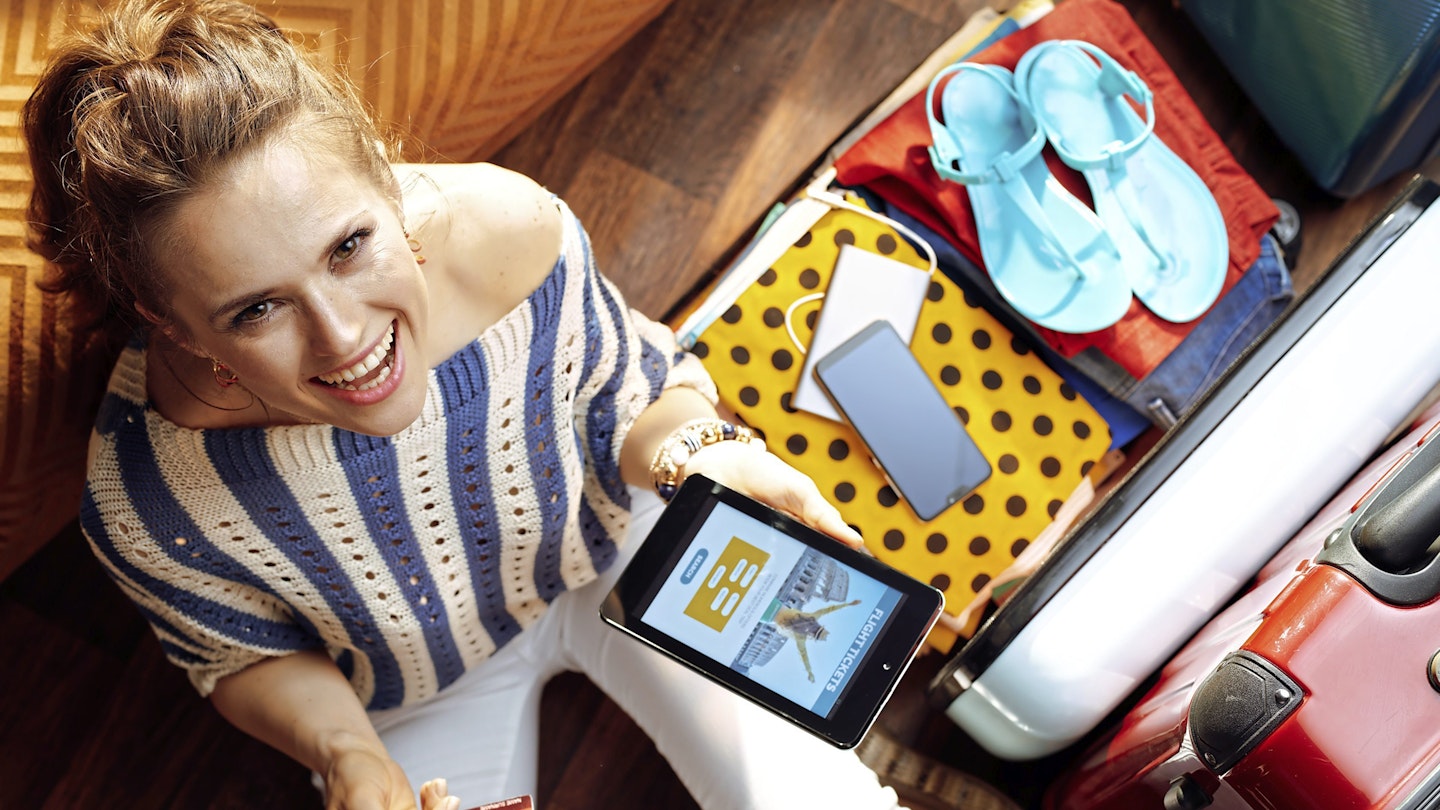Scroll to the bottom to enter the comp to win an Outdoor World Direct family tent, worth £400.
Tracking and understanding your spending is not just important for everyday expenses, but also for exciting, big-ticket spends. Here, travel savings expert Jane Hawkes, aka Lady Janey, explains How to Create the Ultimate Holiday Budget…

It’s easy to go overboard when planning a dream holiday. But covering the costs can be a financial strain. Thankfully, with a good budgeting plan, it’s possible to enjoy that much-needed holiday without breaking the bank. Here’s how…
Set a goal
Jane says: ‘Decide what kind of holiday you’d like to go on, and how you are going to be able to do that through effective budgeting. This is an opportunity to get the whole family involved from the outset, so they understand the need for a budget, and you’re all agreed on what this will involve.’
Work out what you can afford
Jane says: ‘Deduct essential expenditure such as mortgage, rent, utility bills, council tax and your mobile phone bill from your net income or “take home pay”, to see how much you have left over every month, and how much of that you can afford to save towards your holiday.
‘If you want to go on a pricier holiday, accept that you’ll have to give yourself more time to save up.
‘Don’t over-stretch yourself unnecessarily. Choose a holiday that is within what you can afford and set realistic achievable goals.
‘Also, remember to keep an emergency fund for those unexpected outgoings that might scupper your holiday saving plan.’
Do your research
Jane says: ‘Use a comparison site or holiday-money calculator, such as TUI’s holiday-spending money calculator, to work out how much money you’ll need to take with you.
‘Choose where you are travelling to, and when, the number of people in your group, the type of trip (luxury, family, art and culture or adventure), type of lodging (B&B, all-inclusive, hotel, half-board or self-catering), plus estimated number of meals and drinks for that period — the recommended amount of money you’ll need will be suggested.’
Consider your destination
Jane says: ‘Draw up a destination-specific list of expenses, as costs range depending on location. It’s really important to do your research carefully and compare costs for your chosen country, so you can get the most bang for your buck. Choose your destination wisely and consider where your pound will go furthest while you’re away.’
Consider all costs
Jane says: ‘Create categories for each part of the holiday, with estimated costs for areas such as transport, accommodation, food and drink, entertainment and shopping.
‘You might also want to create sub-categories. For example, transport could include airport transfers, car hire, public transport costs or taxis.
‘Make sure you have an “extras” fund for any little bits and pieces you might pick up when away, such as an impromptu souvenir. Other expenses could include travel insurance, passport renewals, visas and other miscellaneous sundries.
‘Minimise excess costs by planning for every possible scenario, and set a spending limit for categories where you are likely to overspend.
‘After your holiday, it’s worth making a note of budgeted as compared to actual costs for easy tracking of expenses on future holidays.’
Get budgeting
Jane says: ‘Once you’ve figured out the total cost of your trip, divide that by the number of months before you plan to go on holiday. Once you have a monthly figure, work out the best way to budget and how you can cover that amount without over-stretching yourself.
‘If you already follow the 50/30/20 rule of budgeting, with 50 per cent allocated to essential spending, 30 per cent to non-essential and 20 per cent on savings, consider if the percentages can be sensibly adjusted to suit your holiday budget.
‘You can find budgeting templates online or create your own in Excel, using similar headings. There are lots of free online budgeting tools, and you’ll find simple downloadable spreadsheets. But simply recording all details using a notebook and pen can be just as useful.’
Change your mindset
Jane says: ‘If you think budgeting is boring, then it’s useful to realise it’s a tool to help you enjoy the things you want to in life, without the stress of struggling to pay.
‘Budgeting might seem daunting to start with. But once you get cracking, you’ll be on a roll in no time. In the long-term, budgeting for any kind of expense can help you develop better financial habits, and give you the confidence and flexibility to spend your money wisely.
‘Budgets are a way to manage your money effectively, and they are designed to be positive and constructive, not restrictive.
‘Creating a holiday budget should be fun, and if you do it well, you can still enjoying spending as you save.’
Get saving
Jane says: ‘Set up a regular payment to a holiday savings account pot, so it becomes part of your “essential” spending, as opposed to irregular payments made on a whim as and when you have extra money to pay in.
‘Jam jar or envelope saving plans are useful budgeting tools. You can separate disposable income into different money pots using cash or, if you prefer, apps such as HyperJar, which does the same thing virtually.’

Use apps
Jane says: ‘Budgeting apps enable you to budget for whatever you want. They can give you money prompts, identify any unnecessary spending, allow you to set a reasonable budget, provide notifications and create savings pots for each area of expense to track your spending.
‘Also, to keep tabs on your holiday spending, consider using an app-based account such as Revolut for travel money — it’s free to use abroad as long as you don’t exceed the monthly limits (unlike normal debit cards).
‘Once you’ve set a budget, just top up your pre-paid card and enjoy spending your money without the worry of overspending and incurring any extra charges.’
Find a budgeting buddy
Jane says: ‘If you’re planning a solo trip, find a budgeting buddy for accountability and support. Comparing budgeting and savings ideas is more fun than sailing solo, and you’ll achieve your goals far sooner.’
Free up funds
Jane says: ‘See if you can clip appropriate household expenses to free up money. For example, switching to cheaper tariffs for internet and phone providers, or by pausing or cancelling any non-essential subscriptions for the budgeting period.
‘Remove temptation to stray from your budget by unsubscribing from all promotional marketing emails. And look for ways to give your savings pot an instant boost.
‘For example, maybe swap banks to avail of cash incentives up to £200, or go through your shed, wardrobe and cupboards to find things you no longer use and could possibly sell.’
Ask a favour
Jane says: ‘If you find yourself busting the budget, think of ways to reduce costs. For example, asking friends, family or neighbours to help with caring for your pet while you’re away, or transporting you to and from the airport.’
Don’t skimp on insurance
Jane says: ‘Make sure you have comprehensive travel insurance to cover all eventualities. If you go for the cheapest policy, you might find you’re not covered for some of the most basic claims. It’s worth paying a few pounds extra for more comprehensive cover.’
Don’t get into debt
Jane says: ‘The last thing you need is to plan the trip of a lifetime only to then spend what feels like a lifetime trying to pay the money back.
‘It isn’t worth getting into debt just for a week or two in the sun. Better budgeting will mean you can keep on top of your holiday finances and avoid getting carried away in the moment.
‘It will also give you peace of mind and confidence in knowing you will be able to handle and cover any surprise expenses that might crop up.’
● Follow Jane at ladyjaney.co.uk
